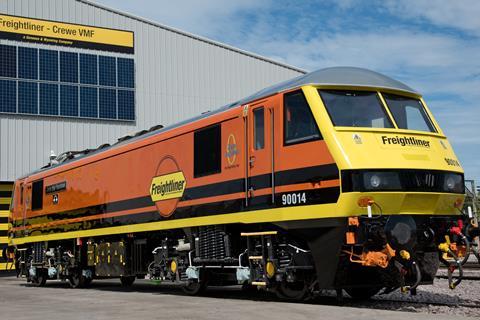
UK: Some rail freight operators have temporarily replaced electric haulage with diesel traction, following significant increases in the cost of traction electricity. The increase between September and October is understood to be more than 210%.
Network Rail said the costs were the result of price rises in the wholesale electricity market. ‘Electricity costs for Network Rail and passenger operators were negotiated some time ago and are fixed for this year and most of next’, the infrastructure manager told Rail Business UK. ‘A few operators, however, are subject to the current market wholesale price of electricity that Network Rail passes on directly at cost.’
Freightliner told Rail Business UK it had taken the ‘difficult decision’ to switch from electric to diesel in order to ‘maintain a cost-effective solution for transporting essential goods and supplies around the UK’.
It stressed that ‘rail remains the most carbon-efficient way to transport freight around Great Britain even with diesel locomotives, with each tonne of freight moved by rail instead of road reducing CO2 emissions by 76%.’
DB Cargo UK told Rail Business UK ‘the significant increase in the price of electricity is challenging, however we have no plans at the present time to suspend operating our fleet of Class 90 and Class 92 electric locomotives.’
It said ‘what this issue does underline however is the need for a diversified approach to decarbonisation. For example, DB Cargo UK’s recent adoption of hydro-treated vegetable oil fuel in its diesel fleet is already delivering significant carbon savings for the company and its customers.’
Direct Rail Services said ‘our fleet of locomotives offers the flexibility to adapt to changing market conditions while maintaining a safe, secure and reliable service. That might mean we change the type of traction we use on our train services in response to temporary fluctuations in energy prices.’
‘Backwards step’
The RMT trade union said one operator had reported an £8m increase in costs, which risked ‘wrecking’ the freight industry while increasing the use of diesel on both rail and road.
‘With the road haulage industry already in turmoil, and with the threat of empty shelves this Christmas, we should be encouraging the use of rail freight not battering it into submission with electricity charges that will add millions of pounds to rail freight companies’ bills’, said RMT Secretary General Mick Lynch. ‘It is a nonsense that it will be far cheaper to run dirty, polluting diesel units rather than the clean electric alternative. The government cannot wash their hands of this and must step in to support the green rail option before it’s too late.’
Mick Whelan, General Secretary of train drivers’ union ASLEF, said ‘this backwards step – forced on the freight industry by government inaction – will drive a freight train through our green credentials and make our targets that much harder to achieve.’



